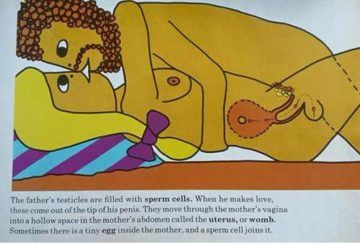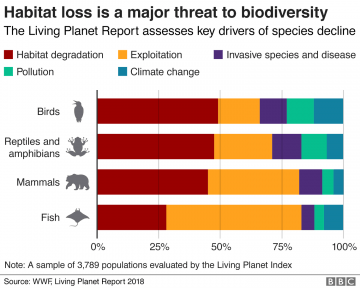by Akim Reinhardt

A wave of friends is having babies. I’m 51 years old so this is nothing new. Friends of mine have been having babies for nearly three decades. However, this time it feels different, and not because I’m now old enough to be a grandfather. Rather, as we approach the year 2020, my ambivalence stems from the indisputable fact that humanity is destroying the planet.
Human beings have initiated a mass extinction. We’re probably closer to the beginning than the ending of the process, but it’s already worse than anything since the dinosaur die-off 65,000,000 years ago. Under normal circumstances, 1-5 animal species go extinct per year. But we’ve so damaged the planet’s ecosystems that on average dozens of species are now dying off every day. Just since 1970 we’ve wiped out 60% of all mammals, birds, fish, and reptiles.
We’re facing a near-future (the mid-21st century) where half of all the planet’s animal species will be gone. And it’s not just animals. Plant extinctions are occurring at a rate 500x faster than we would normally expect, and twice the rate of all mammal, bird, and amphibian extinctions combined. It looks even grimmer going forward. Human activity threatens to render no less than one million animal and plant species, a quarter of all life forms on Earth, extinct.
How are we bringing about this devastation? It’s tempting to point the finger at climate change. But truthfully, to some extent warming temperatures are merely symptomatic of a larger problem.
Yes, mass extinctions and climate change clearly have overlapping causes and consequences, however, it is important not to confuse and conflate them. If we waved a magic wand, completely ended carbon emissions tomorrow and instantaneously reversed global warming, some elements of the mass extinction would cease, and others would slow down. However, the larger process of mass extinction would continue on, largely unabated. Why? Because the mass extinction we are now witnessing is only worsened by climate change, not fundamentally caused by it. The unavoidable and damning truth is that both climate change and the mass extinction have the same root cause: humanity.
Homo sapiens is destroying the planet’s ecosystems and killing off most of its plants and animals; climate change is merely one aspect of that larger process.
Others searching for a silver bullet exlpanation are quick to blame capitalism. I, however, find this to be a dangerously narrow assessment. For starters, the Soviet Union and its communist satellites were very, very good at wrecking environments. Beyond that, however, attempting to understand this complicated process through little more than economics is simplistic and deterministic. So small a lens actually creates blinders; it reveals a small piece of the truth while missing the larger picture.
Is capitalism a problem? Of course. But it is merely one factor exacerbating a larger complex of causes. The main driver in all of this is nothing less than human existence. Capitalism is simply making a bad situation worse. Under any economic system people need food, housing, and clothing, and that in itself is enough to produce pollution and environmental destruction. Scale it up to nearly 8 billion of us and the entire planet suffers no matter what economic system we employ, and even with the understanding that some systems are more deleterious than others.
Environmental manipulation and destruction is endemic to the human condition. Amateurs like to daydream about the mysterious, stony ruins left behind by some ancient peoples, but in fact, most archaeologists spend much of their time digging through ancient garbage pits. By and large, that’s what we leave behind.
Thus far history has shown us that to be human is to use, to discard, and to manipulate, change, and harm the surrounding environment. It’s who we are. It’s what we do, even at the most basic level of human endeavor a hundred thousand years ago. And then ten thousand years ago we began experimenting with proto-farming.
Farming led to food surpluses, which in turn allowed for labor specialization and population booms. Both were important turning points. Labor specialization created a demand for new resources beyond the necessities of basic food, clothing, and shelter. Ever more kinds of resources were used to produce luxury goods, status goods, and new machines and tools that facilitated labor, recreation, and of course more resource extraction.
And then there’s the numbers game.
Harvesting only wild plants and animals puts a cap on human population growth. Under those conditions, animal protein in particular is limited by the land’s natural carrying capacity. The sun grows plants, animals eat some of those plants, then people eat the animals. In short, it’s inefficient. There are only so many wild animals per square mile, and thus only so many humans. But if you cutout a step and eat mostly plants the sun produces, you potentially have more food. And if you tinker with those plants to increase their calories and nutrition, then suddenly you have agricultural abundance to feed both humans and the animals they’ve domesticated. With agriculture, you can have just about as many people and domesticated animals as you’d like.
How many, exactly? There are currently 7.7 billion people and counting. And reproduction far outpaces mortality. Humanity is currently adding two new babies for every dead person. There are also roughly:
19 billion chickens
2 billion pigs
1.5 billion domestic cattle
900 million dogs
Half-a-billion small cats
On some level, it’s simply a numbers game. We and our select species of animals are destroying the natural habitats of most other life forms. Our habitats are squeezing out theirs. Add to it the pollution we generate, our various resource extraction enterprises, our selective breeding and hunting practice, and of course climate change, and the results are stark: we have remade the Earth as a place where few other species can survive in the long term. And we’re not done.

The longstanding, general human trend is that birth rates dip with the rise of urbanization and economic development as children become consumers instead of producers. However, this is complicated by increasing life expectancy. Best estimates predict that human population growth will continue throughout the 21st century, eventually topping out at nearly 11 billion: a population gain of about 40% over today’s total. To put that into perspective, from the years 1950 – 2100, human population will have exactly quintupled. Thus, even if the total human population does plateau by century’s end, it will have capped off 150 years of devastating growth, and have peaked at an utterly disastrous eleven-figure level.
British economist, demographer, and historian Thomas Malthus (1766 – 1834) once fretted that the booming human population, then eclipsing 1 billion, would soon be incapable of growing enough food to feed itself. The irony of his wrongheadedness is staggering. The problem is now precisely the opposite; that no matter how fast the human population grows, we can feed ourselves through ever more efficient and productive husbandry practices. That our expansive agricultural, ranching, and housing lands are destroying wild habitats. That emissions from our cattle and cars are creating a hot box canopy. That billions of human beings demand evermore fashion and phones, roads and cars, water and straws, and countless stupid little baubles and distractions, all of which are extracted from the Earth at a rapacious rate, and then quickly discarded back into dying ecosystems as environmentally detrimental trash.
I am an eldest child, and before I was born, my father made a lot of noise about how he would never “bring a child into this world.” This was 1960s, when the United States, and indeed much of the world, was beset by violence and upheaval. With tumultuous gender and race relations, the first signs of deindustrialization, and even a nascent environmental consciousness at home, along with the ravages of the Cold War, Vietnam, and de-colonization abroad, it seemed to him that the world was afire. Always a bit melodramatic, fiercely independent, fairly selfish, and not yet “ready” to have kids, he judged the world of 1966 as nothing a new baby should be subjected to.
His proclamations were, of course, histrionics. He went on to have two children, and a would-be third if not for an illness. But his earlier doubts about the general morality of human reproduction were quite different from my own current ones. His were based on presentist concerns about human social relations. When he talked about “the world,” really he meant the way people conducted themselves and treated each other. Humanity was a mess, as he saw it, and at least for a while he considered it immoral to subject new people to the social maelstrom humans had unleashed. My concerns today about the morality of having children are fundamentally different.
Whereas my father’s ultimately empty threat to not reproduce grew from his disenchantment with human relations, I question the morality of baby-making out of a concern for the world in its entirety. He worried about what kind of world a new child would be subjected to; I worry about what each new child will do to the world merely by living a long, healthy, and happy life. And if my father eventually gained faith that humanity could overcome its worst tendencies and thrive, I have come to believe that even a peaceful, prosperous state of humanity is not the solution but indeed the problem. Our very existence at its current scale, compounded by our current practices, is simply untenable for most other plants and animals. We have already reconfigured much of the Earth beyond recognition, and will continue to do so until there is little animal and plant life left except for us, our chosen few, and the handful we overtly disdain and label “pests” for having the temerity to profit amid our nastiness (eg. roaches and rats).
With this in mind, it is not outlandish to suggest that the birth of every new human baby is, among other things, an act of violence against most of the world’s remaining animal and plant species. We can parse issues and debate the merits of childlessness versus single-child families as responsible paths to a desperately needed human population decline. But either way, the larger reality persists: Humanity does not hold the solution to the planet’s environmental catastrophes; humanity is the problem.
And so now, as another cohort of friends have children, I am at once happy for the unparalleled jubilation it brings them, but also deeply saddened by these little bundles of joy, each one another tiny razor flashing in the death by 7.7 billion cuts (and counting) that humanity is inflicting upon much of the planet.
By having babies, my friends are understandably following one of their most basic instincts and urges, and at the same time realizing their greatest dreams in life. But in our current day and age, amid human-caused mass extinction, are they also being immoral?
Akim Reinhardt’s website is ThePublicProfessor.com
